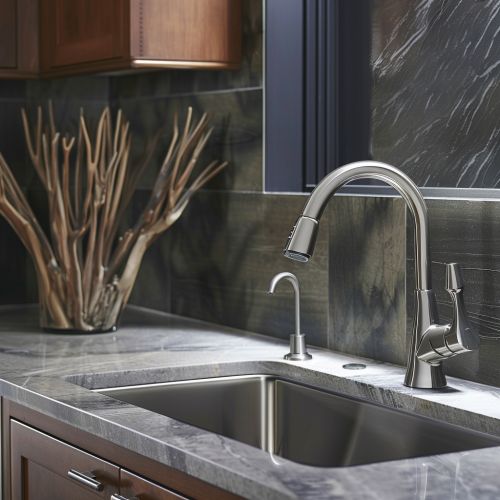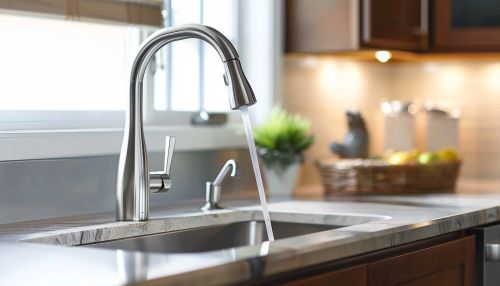Pull-down faucet
Overview
A pull-down faucet is a type of kitchen faucet that features a spray head attached to a hose, which can be pulled down into the sink area for versatile use. This design allows for greater flexibility and control when washing dishes, rinsing produce, or cleaning the sink. Pull-down faucets are commonly found in modern kitchens due to their functionality and aesthetic appeal.
Design and Functionality
Pull-down faucets are engineered with a high-arc spout that provides ample clearance for large pots and pans. The spray head is typically equipped with a button or lever that allows the user to switch between different spray modes, such as a steady stream or a powerful spray. The hose is usually retractable, returning to its original position after use thanks to a counterweight or a spring mechanism.
Components
The main components of a pull-down faucet include:
- **Spout**: The high-arc design of the spout provides clearance and reach.
- **Spray Head**: The detachable head that can be pulled down into the sink.
- **Hose**: The flexible tube that connects the spray head to the water supply.
- **Counterweight/Spring**: Mechanisms that help retract the hose back into the spout.
- **Valve**: Controls the flow and temperature of the water.
- **Mounting Hardware**: Secures the faucet to the sink or countertop.
Materials and Finishes
Pull-down faucets are available in a variety of materials and finishes to match different kitchen styles. Common materials include stainless steel, brass, and plastic. Popular finishes include chrome, brushed nickel, oil-rubbed bronze, and matte black. The choice of material and finish affects not only the faucet's appearance but also its durability and ease of maintenance.
Installation
Installing a pull-down faucet typically requires basic plumbing skills. The process involves removing the old faucet, preparing the sink or countertop, and securing the new faucet in place. Key steps include: 1. **Shutting off the water supply**. 2. **Removing the old faucet**: Disconnecting the water lines and mounting hardware. 3. **Preparing the sink/countertop**: Cleaning the area and ensuring the mounting holes are compatible. 4. **Installing the new faucet**: Securing the faucet with mounting hardware and connecting the water lines. 5. **Testing for leaks**: Ensuring all connections are secure and the faucet operates correctly.
Maintenance and Troubleshooting
Proper maintenance of a pull-down faucet involves regular cleaning and occasional troubleshooting. Common issues include:
- **Mineral buildup**: Can be addressed by soaking the spray head in vinegar.
- **Leaking**: Often caused by worn-out O-rings or washers, which may need replacement.
- **Hose retraction problems**: May require adjusting the counterweight or replacing the hose.
Advantages and Disadvantages
Advantages
- **Versatility**: The pull-down feature provides greater flexibility for various kitchen tasks.
- **Aesthetic appeal**: Modern designs enhance the look of the kitchen.
- **Ease of use**: Intuitive controls and ergonomic design.
Disadvantages
- **Cost**: Generally more expensive than standard faucets.
- **Complexity**: More components mean more potential points of failure.
- **Space requirements**: The high-arc design may not be suitable for kitchens with limited space.
Innovations and Trends
Recent innovations in pull-down faucets include touchless operation, integrated water filtration systems, and advanced spray technologies. Touchless faucets use motion sensors to activate the water flow, reducing the spread of germs and making kitchen tasks more convenient. Integrated filtration systems provide clean, filtered water directly from the faucet. Advanced spray technologies offer multiple spray patterns and enhanced water pressure for improved performance.
See Also
References


